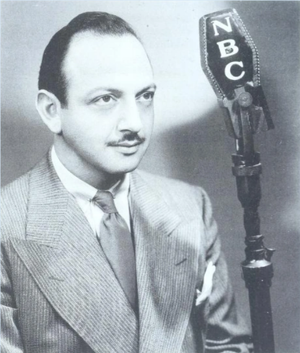Mel Blanc
| Mel Blanc | |
|---|---|
 Blanc (circa 1933). | |
| Born | Melvin Jerome Blank May 30, 1908 San Francisco, California |
| Died | July 10, 1989 Los Angeles, California |
| Cause of death | Heart disease Emphysema |
| Nationality | American |
| Occupation(s) | Voice actor Radio personality |
| Characters played | Bugs Bunny Daffy Duck Porky Pig Tweety Bird Sylvester Pepé Le Pew Yosemite Sam Foghorn Leghorn Barnyard Dawg Henery Hawk Marvin the Martian Wile E. Coyote Speedy Gonzales Tasmanian Devil Elmer Fudd Goofy Gophers Charlie Dog Ralph Wolf Sam Sheepdog |
Melvin Jerome Blanc (born Blank; May 30, 1908 – July 10, 1989) was a voice actor and radio personality known for being one of the most influential people in the voice acting career, and for being known as "The Man of a Thousand Voices". He worked for the Warner Bros. animation studio, where he was known famously for originating nearly all the characters' voices in the Looney Tunes and Merrie Melodies theatrical shorts, including Bugs Bunny, Daffy Duck, Tweety Bird, Sylvester, Yosemite Sam, Foghorn Leghorn, Pepé Le Pew, Marvin the Martian, and Porky Pig among many others.
Biography
Roles
20th century
Other roles
Before his career at Warner Bros. Blanc was a radio personality, and had done various credits during the Golden Age of Radio for programs such as The Jack Benny Program, Fibber McGee and Molly and The George Burns and Gracie Allen Show. For Jack Benny, he provided the distinct voices for Benny's Maxwell automobile, violin teacher Professor LeBlanc, Polly the Parrot, Benny's pet polar bear Carmichael and the train announcer. Blanc would reprise many of these roles when The Jack Benny Program transitioned to television in 1950.
Blanc was briefly attached as the initial voice of Woody Woodpecker (including his trademark laughter) for Walter Lantz's series of theatrical shorts for Universal, but stopped after the character's first three shorts when he signed an exclusive contract for Warner Bros. Despite this, Blanc's laugh was used in the Woody Woodpecker cartoons until 1951, when Gracie Stafford provided Woody's voice and laugh until the series' end in 1972.[1]
He was hired to provide the voice for Gideon the cat, in the 1940 Disney feature film Pinocchio, but it was eventually decided that the character would be mute (save for a hiccup heard three times in the final film).[2]
In the later years of his career, Blanc provided the voices for several characters in Hanna-Barbera's animated shows, including Barney Rubble and Dino from The Flintstones, Mr. Spacely from The Jetsons, Secret Squirrel from The Atom Ant/Secret Squirrel Show, the title character of Speed Buggy, and Captain Caveman from Captain Caveman and the Teen Angels. He also provided the voices for Tom and Jerry during Chuck Jones' run on the titular theatrical shorts.
Blanc's last original character was Heathcliff, whom he voiced in both the 1980 Ruby-Spears animated series and the 1984 DIC Enterprises series.
Behind the scenes
- When voicing Bugs Bunny, Blanc would regularly spit out carrots on a wastebucket in the middle of a recording take and then continue the script. He stated that he did not like raw carrots and had previously tried replacing it with other vegetables like celery, but to no satisfying results.[1]
- Although it was widely known among the Warner Bros. animators that producer Leon Schlesinger had a lisp and that originated the voices for Daffy Duck and Sylvester, Blanc contradicted this in his autobiography that "It seemed to me that such an extended mandible would hinder his speech, particularly on words containing an s sound. Thus 'despicable' became 'desth-picable.'"[1]
- Blanc stated that Sylvester was the easiest character to voice, because "[he's] just my normal speaking voice with a spray at the end".[1]